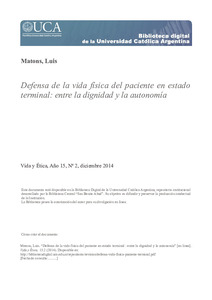Por favor, use este identificador para citar o enlazar este ítem:
https://repositorio.uca.edu.ar/handle/123456789/1487| Título: | Defensa de la vida física del paciente en estado terminal : entre la dignidad y la autonomía | Autor: | Matons, Luis | Palabras clave: | MUERTE DIGNA; ENFERMOS TERMINALES; RELACION MEDICO-PACIENTE; EUTANASIA; AUTONOMIA; BIOETICA | Fecha de publicación: | 2014 | Editorial: | EDUCA | Cita: | Matons, Luis. “Defensa de la vida física del paciente en estado terminal : entre la dignidad y la autonomía” [en línea]. Vida y Ética, 15.2 (2014). Disponible en: https://repositorio.uca.edu.ar/handle/123456789/1487 | Resumen: | Resumen: Proponemos un análisis crítico de los fundamentos que sustentan la llamada “Ley de Muerte Digna” incorporada en la Ley que consagra la regulación de los derechos del paciente, historia clínica, consentimiento informado, (Art. 2º, inc. “e” párr. 2º de la Ley 26.529 modificada por la Ley 26.742), que introduce en nuestro país la existencia real de un sistema eutanásico formal sin fundamentos de orden científico, éticos e incluso jurídicos. ¿Es moralmente lícito suprimir la vida del enfermo terminal?, ¿la legalización de esta práctica eutanásica es la primera piedra de una nueva “cultura” de la vida? Entendemos que la llamada “tesis de la autonomía”, fundante de la reforma legislativa en cuestión, desde una óptica Bioética personalista, merece serias objeciones bioéticas ya que puede distorsionar gravemente el ejercicio de la medicina y la relación médico paciente. Abstract: We propose a critical analysis of the grounds for the so-called "Death with Dignity Act" embodied in the law that regulates the patient´s rights, their medical history and informed consent (Art. 2, Section “e” Paragraph “2nd of law 26.529 amended by Law 26742, which introduces in our country the real existence of a formal euthanasia system lacking scientific, ethical or even legal grounds. Is it morally licit to suppress the terminally ill´s life? Does the legalization of this practice constitute the first step for a new “culture “of life? We understand that the so called “thesis of autonomy”, the basis for the legal amendment at issue, deserves from a personalistic bioethical point of view serious bioethical objections, since it can severely distort the exercise of medicine and the patient-physician relationship. |
Cobertura Espacial: | ARGENTINA | URI: | https://repositorio.uca.edu.ar/handle/123456789/1487 | ISSN: | 1515-6850 | Disciplina: | BIOETICA | Derechos: | Acceso Abierto | Fuente: | Vida y ética, 15(2), 2014 ISSN 1515-6850 |
| Aparece en las colecciones: | VE - 2014 Año 15 nro. 2 |
Ficheros en este ítem:
| Fichero | Descripción | Tamaño | Formato | |
|---|---|---|---|---|
| defensa-vida-fisica-paciente-terminal.pdf | 262,1 kB | Adobe PDF |  Visualizar/Abrir |
Visualizaciones de página(s)
636
comprobado en 30-abr-2024
Descarga(s)
2.311
comprobado en 30-abr-2024
Google ScholarTM
Ver en Google Scholar
Este ítem está sujeto a una Licencia Creative Commons

